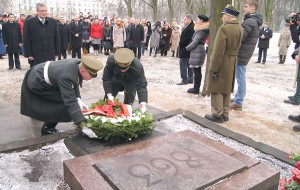- February 18, 2013
- 462
Was the President of Poland kindly welcomed in Vilnius?

“It’s significant to say that for a few past years Poles and Lithuanians have been emphasising their respect for the sovereignty of the neighbouring country by, for instance, the presence of the presidents during the celebrations commemorating the restoration of independence in 1918,” the President Bronislaw Komorowski said.
On Saturday, Bronislaw Komorowski, invited by the Lithuanian President Dalia Grybauskaitė, took part in the celebrations of the 95th anniversary of the Lithuanian State Reestablishment Day. After the ceremonies held in the S. Daukantas Square both presidents had a conversation. It was their first meeting since April 2012 when the President Dalia Grybauskaitė broke with tradition of regular meetings between the heads of both states. That is why the Saturday meeting was closely observed by the media and politicians, not only because it was perceived as a courtesy call to celebrate the important event but, above all, as a new direction for improvement of Polish-Lithuanian relations. After the meeting, many observers spotted that the Polish President was treated differently – he was kept at the distance and welcomed with little warm in Vilnius.
While the Polish President was emphasised that although Poland and Lithuania were accomplishing national goals and guided by own national interests and needs, both countries were going in the same direction. The Lithuanian President emphasised in her speech the need to take individual actions, also on the level of the international arena.
“We are together because we belong to the democratic world, NATO and UE,” the President Komorowski said.
“We must focus on that what is really vital and we should not allow the others to make decisions for us. Do not change freedom into temporary benefit. Even though it is the election time or fight for the energetic independence or the development of international relations,” the President Grybauskaitė stressed.
A day before the ceremony, the President Grybauskaitė had been even more sincere claiming the Lithuania did not have any real friends around herself.
“We face problems on different dimensions. These are the external pressures, global challenges and the fact that small nations, who live next to the bigger ones, sometimes have problems with defending their interests. It is necessary to look for friends, but not egoistic ones. Rather these which want to befriend without making premature conditions. There are not too many such friends around us,” the President Grybauskaitė said.
Taking into consideration the state of Polish-Lithuanian relations, the lack of words during ceremony was very meaningful. As the observers of Saturday’s celebrations noticed, the President Grybauskaitė mentioned nothing in her speech about the presence of the Polish President. The occurrence of an incident was inevitable – during the ceremony held in the S. Daukantas Square one of the participant displayed a poster with slogan saying that Lithuania is not the Poland’s provinces. After the ceremony both presidents had a conversation. They discussed, among others, the prospects of Lithuanian presidency in the European Union and the summit of the Eastern Partnership which will be held in autumn. Probably, it was the first time when the presidents of Poland and Lithuania did not talk about the issue of Polish minority in Lithuania. These matters were clearly omitted at the Lithuanian President’s request.
“The President of Lithuania hosted the meeting,” Bronislaw Komorowski answered for journalists’ question whether he had talked with President Grybauskaitė about the issues concerning Lithuanian Poles. It is certain that the President talked about the situation of Polish minority with the representatives of the minority. The meeting took place in Pac Palace after the official ceremony had ended.
O Saturday afternoon, the President Bronislaw Komorowski lied a wreath on the commemorative plaque dedicated to Zygmunt Sierakowski, the leader of the January Uprising, and Konstanty Kalinowski who participated in the uprising. Then, he lighted a vigil light next to the wall of the Lukiškės Prison.
“Pac is worthy of palace, palace is worthy of Pac. Poland is worthy of Poles in Vilnius Region. Poles who live here deserve more advanced, modern and better Poland. I believe that we can give each other a lot.
We can also make Polish environment more friendly and more important and thus open new prospects, European prospects for the future. Here in Lithuania, a success of Poles –– a political and electoral success, a success in a form of survival, a success in terms of creating the social and national unit – is also a part of Poland’s success. It is a part of this great success of the democratic, free, independent and stable Poland which sets a good example and shows how to organise life and world around us better,” the President Komorowski said during the meeting with Polish society. The President congratulated and thanked for the Polish electoral success and a membership in the ruling coalition.
“It gives new prospects and possibilities on the level of Polish-Lithuanian relations and on the socio-national and state level,” the Polish President said. Komorowski also added that Poles in Lithuania not only gained a chance for themselves but also a chance for better Polish-Lithuanian relations. The President assured Lithuanian fellow countrymen that Poland is going to support Polish minority in Lithuania. However, he also stressed the need to understand how the Lithuanians look at Vilnius and Poland.
“We need to look for the better. There are a lot of good things despite our differences and complicated history. We should join together and share a brand new world,” the Polish President emphasised.
Source: http://kurierwilenski.lt/2013/02/18/czy-prezydent-polski-byl-mile-widziany-w-wilnie/
Tłumaczenie Patrycja Olszówka w ramach praktyk w Europejskiej Fundacji Praw Człowieka, www.efhr.eu. Translated by Patrycja Olszówka the framework of a traineeship programme of the European Foundation of Human Rights, www.efhr.eu.

